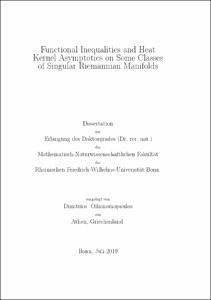Oikonomopoulos, Dimitrios: Functional Inequalities and Heat Kernel Asymptotics on Some Classes of Singular Riemannian Manifolds. - Bonn, 2019. - Dissertation, Rheinische Friedrich-Wilhelms-Universität Bonn.
Online-Ausgabe in bonndoc: https://nbn-resolving.org/urn:nbn:de:hbz:5n-56577
Online-Ausgabe in bonndoc: https://nbn-resolving.org/urn:nbn:de:hbz:5n-56577
@phdthesis{handle:20.500.11811/8112,
urn: https://nbn-resolving.org/urn:nbn:de:hbz:5n-56577,
author = {{Dimitrios Oikonomopoulos}},
title = {Functional Inequalities and Heat Kernel Asymptotics on Some Classes of Singular Riemannian Manifolds},
school = {Rheinische Friedrich-Wilhelms-Universität Bonn},
year = 2019,
month = nov,
note = {This thesis consists of two parts.
In the first part we are focusing on stratified pseudomanifolds equipped with an iterated edge metric. More specifically, in Chapter 1 we give the basic definitions and review some basic constructions concerning stratified spaces and iterated edge metrics. Furthermore we introduce the notion of edge vector fields and weighted Sobolev spaces which naturally arise in these spaces, and prove some of their properties. In Chapter 2 we are focusing on stratified pseudomanifolds of depth 1, the so called simple edge spaces. We introduce Sobolev spaces and we compare them with the weighted Sobolev spaces we previously defined. Furthermore, by taking into account the special structure of simple edge spaces we prove the validity of the classical functional inequalities (Sobolev, Poincare, Sobolev-Poincare). Moreover, we examine the existence of appropriate cut-off functions and as an application we obtain an optimality result on the B-constant of the Sobolev inequality.
In the second part of the thesis we are focusing on the Dirichlet heat kernel and it's asymptotics as t → 0. More precisely, in Chapter 3 we consider the case of compact manifolds with corners satisfying a specific assumption on the metric. Under this assumption we construct a heat calculus that contains information about the asymptotic behaviour and examine it's properties. After elaborating on this, we prove that the Dirichlet heat kernel belongs in this calculus and therefore we are able to obtain a complete asymptotic expansion as t → 0.},
url = {https://hdl.handle.net/20.500.11811/8112}
}
urn: https://nbn-resolving.org/urn:nbn:de:hbz:5n-56577,
author = {{Dimitrios Oikonomopoulos}},
title = {Functional Inequalities and Heat Kernel Asymptotics on Some Classes of Singular Riemannian Manifolds},
school = {Rheinische Friedrich-Wilhelms-Universität Bonn},
year = 2019,
month = nov,
note = {This thesis consists of two parts.
In the first part we are focusing on stratified pseudomanifolds equipped with an iterated edge metric. More specifically, in Chapter 1 we give the basic definitions and review some basic constructions concerning stratified spaces and iterated edge metrics. Furthermore we introduce the notion of edge vector fields and weighted Sobolev spaces which naturally arise in these spaces, and prove some of their properties. In Chapter 2 we are focusing on stratified pseudomanifolds of depth 1, the so called simple edge spaces. We introduce Sobolev spaces and we compare them with the weighted Sobolev spaces we previously defined. Furthermore, by taking into account the special structure of simple edge spaces we prove the validity of the classical functional inequalities (Sobolev, Poincare, Sobolev-Poincare). Moreover, we examine the existence of appropriate cut-off functions and as an application we obtain an optimality result on the B-constant of the Sobolev inequality.
In the second part of the thesis we are focusing on the Dirichlet heat kernel and it's asymptotics as t → 0. More precisely, in Chapter 3 we consider the case of compact manifolds with corners satisfying a specific assumption on the metric. Under this assumption we construct a heat calculus that contains information about the asymptotic behaviour and examine it's properties. After elaborating on this, we prove that the Dirichlet heat kernel belongs in this calculus and therefore we are able to obtain a complete asymptotic expansion as t → 0.},
url = {https://hdl.handle.net/20.500.11811/8112}
}






